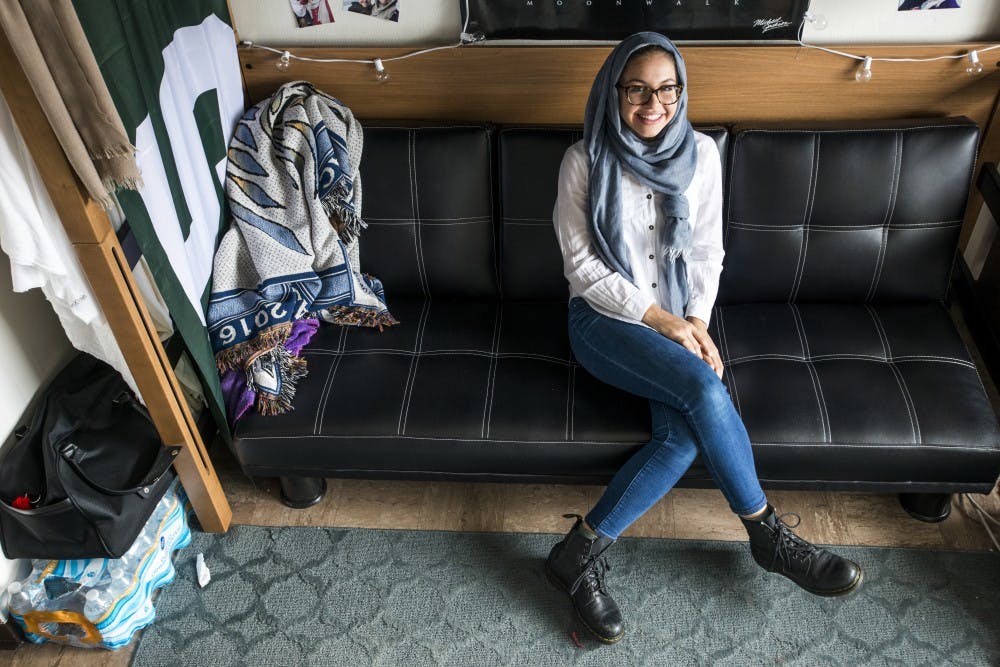Editor's note: Due to privacy concerns, names of some family members have been removed.
For Muslim-American student, executive order clouds family's future

Lyman Briggs freshman Maya Al-saghir heard about President Donald Trump's executive order banning citizens from seven Muslim-majority countries from traveling to the United States on Jan. 27. As a first-generation Muslim American, Al-sighar was shocked.
"I was very depressed about the situation over the weekend and I couldn’t bring myself to do anything," Al-sighar said. "I couldn’t really deal with the situation."
Al-saghir’s parents immigrated from Syria in the mid-1990s and are United States citizens.
“We’re as American as it gets, me and my siblings were all born here, my parents have been here over 20 years,” Al-saghir said. “I would hope that we wouldn’t be concerned, but you never know. You really never know.”
While Al-saghir said she believes her immediate family will not be affected by the executive order, her extended family has already been negatively affected. She has grandparents, aunts, uncles and cousins who live Syria.
In 2002, Al-saghir’s parents helped her family in Syria apply for green cards. Approximately six months ago, U.S. Citizenship and Immigration Services, or USCIS, contacted her family and told them they were working on applications from 2002. In December, Al-saghir’s family was again contacted because USCIS was working on the month they submitted the green card applications.
“We were like, ‘great, it’s five years into the war, this is pretty good timing, we need this right now, they’re going to want to come,'” Al-saghir said.
Al-saghir’s parents calculated the probable timing of her family's hopeful acceptance and they determined they would arrive in May.
“Now the ban came,” Al-saghir said. “It’s a 90-day ban, so that takes us up to May. It just puts everything on hold.”
One of Al-saghir’s uncles owned a furniture store in Homs, Syria, that burned down during the war.
“He lost everything,” Al-saghir said.
Another uncle used to live in Syria. Then came the rumors that he was going to be drafted for the war at 39 years old. After someone turns 40, they can no longer be drafted.
READ MORE
“He was like, ‘I can’t go to the war, I’m not going to kill innocent people, I can’t do this,'” Al-saghir said.
He was smuggled out of Syria and into Turkey, leaving behind his wife and four kids younger than the age of 10.
“You can’t smuggle out four little kids and a wife,” Al-saghir said. “He is sitting in Turkey with no money, nothing to do, he doesn’t know the language, he doesn’t have a job.”
He and his family are part of the green card applications the USCIS was reviewing.
“We were like, ‘Hopefully when it comes to the summer they’ll be able to come,'” Al-saghir said. “Now that’s on hold as well.”
The uncle who owned a furniture store now takes care of all of Al-saghir's mother's family in Syria, including the wife and four kids of the uncle who fled Syria. All 15 of them live in one apartment. Al-saghir has cousins studying at universities in the Middle East and Asia as well.
Support student media! Please consider donating to The State News and help fund the future of journalism.
One cousin is at the top of his class at an Egyptian university's medical school. She has twin cousins studying at a university in Malaysia. The twins have an academic scholarship that expires at the end of the spring semester and they have no way to pay for more school.
“Essentially, their grades in Malaysia, the schooling that they get there, once they come to America they’re on reset,” Al-saghir said. “Everything they’re doing there is so they don’t sit at home and not get an education, which is a right that everyone should have.”
Trump's executive order affects more than just refugees, though labeling them refugees doesn't tell the full story.
“A lot of us are focusing on the refugee problem, which is tragic, these are people that aren’t even refugees,” Al-saghir said. “These are people that have money, they’re educated, they’re respected.”
After years of waiting and dreaming, only to have their hopes crushed, Al-saghir’s extended family is starting to give up.
“They don’t care if they die,” Al-saghir said. “They really don’t care at this point. They’re just ready for whatever God has in mind. They don’t have a plan and they don’t try to have a plan.”
Al-saghir's parents are working to help those affected by the executive order.
"My parents are very, very active," Al-saghir said. "They’re donating to ACLU and CAIR Michigan. They are constantly contacting the White House … saying we need to do something about this. They’re making a difference, they’re not sitting and moping around about it."
Despite the hardships, Al-saghir and her family are taking it day by day.
"This is not a game, this is not something small that we can just say, 'Okay yeah, 90 days'," Al-saghir said. "People say, 'Stop whining, it’s 90 days, get over yourselves, you’re so sensitive.' This is not something small, this is something that’s affecting thousands of people.”






